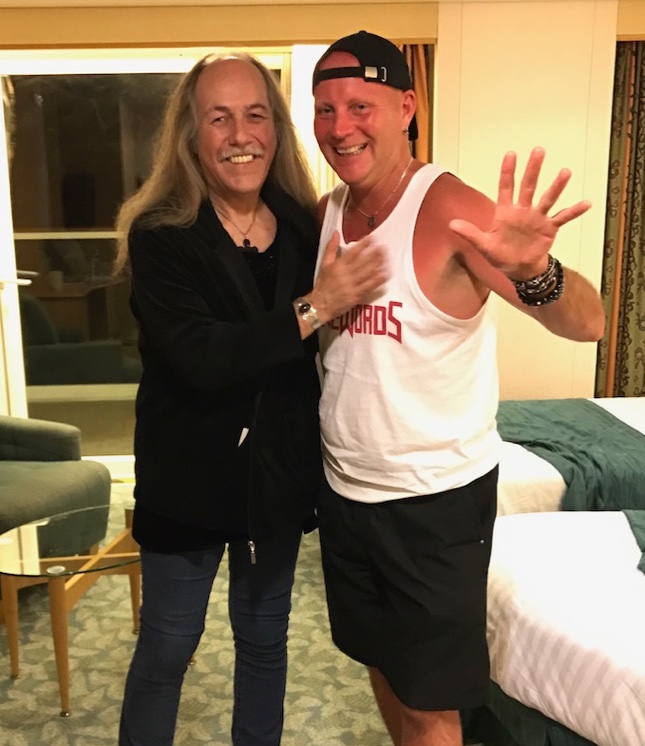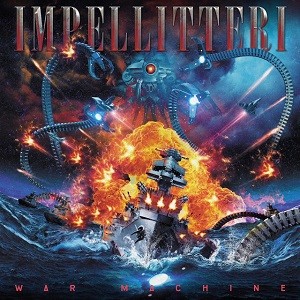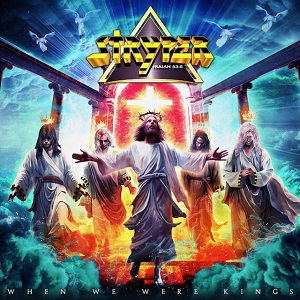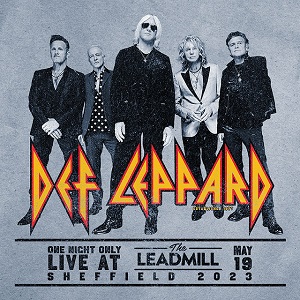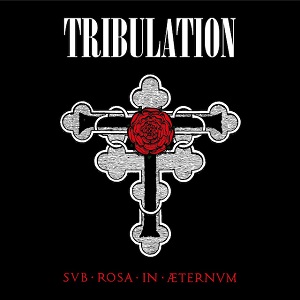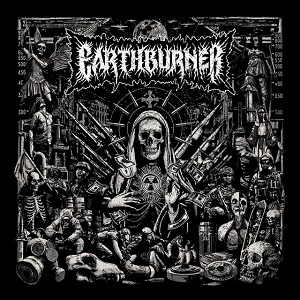ULI JON ROTH - “I Can't Wear 666, I’m Religious”
June 15, 2017, 7 years ago
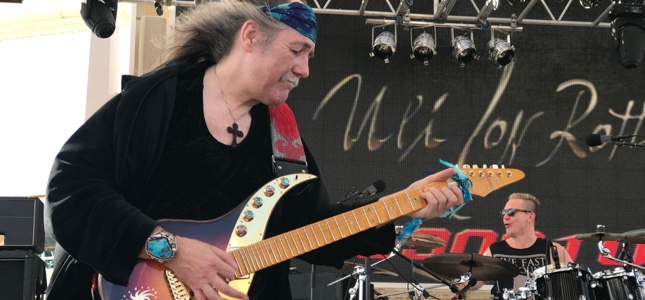
Rule number one in social circles is that there are two topics that should always be steered away from; politics and religion. Not everyone is cut from the same cloth, so truly at the end of the day, just agree to disagree. End of story. But at the recent 70000 Tons Of Metal floating oasis, I was caught off guard, never expecting such a reaction. Expect the unexpected I guess. But as we continue to roll out these Bands That Built BraveWords personalized hockey jerseys, our blackened heart is in the right place. That said, some musicians aren’t as “black” as we expect or want them to be. Such was the case with this glorious soul Uli Jon Roth. A man that ignited the Scorpions early career before journeying off on his own tangent, while the German legends became one of the greatest hard rock acts on the planet. Roth left the band in 1978 following the end of the Taken By Force tour and before the band’s famed Tokyo Tapes release, which coincidentally was celebrated last year with his Tokyo Tapes Revisited - Live in Japan audio/video package.
You won't be stung by this tale…
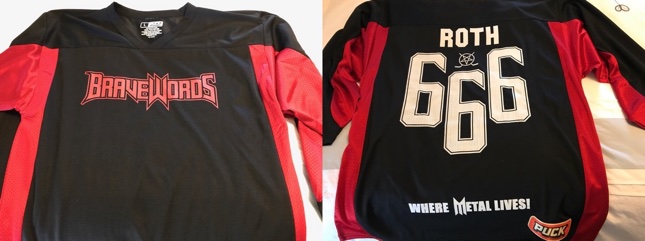
“I can't wear 666,” Roth uttered politely. “I’m religious. So I can’t wear this. It has a pentagram. The shirt looks cool on the front. So I can not accept it. I'm very sorry. But the 666 thing to me is like the other side. I know it's a joke, and I can see the joke side of it, but it’s something that I don't joke with, because I take it seriously. Because I think it's real. I just don't want to bullshit you, so I'm just telling you the truth. Print me one without the back and I'll have it anytime. I know you had good intentions, and I don't feel offended, because I know it's coming from your right place. I appreciate the gift. And I've never turn down a shirt before.”
Alas, this BraveWords interview was certainly not commencing with the proper tone to say the least. But it did get my wheels turning. So we continued with the taboo topic of religion.
“That's one of the issues I have with heavy metal, because to me all of the stuff is real,” Roth continues. “And for most people it isn't. It’s more like Disneyland kind of stuff. But I take it actually very seriously. And that's an issue I have with death metal and all that. To me these are things that I don't joke with. But I still understand. And I'm kind of relaxed about it, to a point.”
BraveWords: I’m a huge black and death metal fan. But I also understand where it all came from; Elvis, The Beatles, Cream, Hendrix and of course all of the heavy metal forefathers
Roth: “Absolutely. But Hendrix was not death, he was life. And that's the problem I have with the metal scene is a certain fascination, even glorification of death and such. I get confronted with the metal world all the time and sometimes I wonder how I'm even part of it, because it's not even really my world. I ended up in a rock band, but I should've been a classical composer. I don't know why this happened to me. I was never really even into rock, but somehow I found my way in it. I know I'm part of the family, and whenever I meet metal guys, they are all really, really nice people.”
BraveWords: But that's the conundrum, because as an outsider listening to the music and reading the lyrics of everybody from Cannibal Corpse to Marduk to Dying Fetus, it's actually doing the opposite. It's not creating a new crop of Jeffrey Dahmers or Ted Bundys. It's therapy. Death actually keeps people alive.
Roth: “I understand that.”
BraveWords: Let’s get back to business. You were possibly the loudest band I’ve ever heard on 70000 Tons Of Metal.
Uli Jon Roth: “Well I had some real amps. I’m like one of the last dinosaurs who still plays the same amps we used to play 40-50 years ago. These were the same amps that (Jimi) Hendrix played and they’re the same we played when in the Scorpions. I still carry that sound. If I take that sound away; it’s not the same. You need to physically feel the molecules of the air when you play that kind of music. That’s what I feel and that’s another problem that I think is wrong with metal at the moment. The people play these small amps and when I listen to it; it’s not very often, but it’s not dangerous anymore. It sounds all over-sanitized. To me, I like this 3D sound you get from a real amp and a real guitar and you don’t hear that very often anymore. Being outdoors on the pool stage; I can do that. I can play 200 watts you know. When I’m in the club, I don’t play as loud. And you know what, my guitar was loud downstairs; onstage I could barely hear it. There was something wrong with the monitors; I was playing like blindfolded a lot of the time. It was strange because normally I could hear myself pretty well being loud, but today I couldn’t. Maybe the wind blew it all away. I don’t know, it was the windiest gig of my life.”
BraveWords: I looked over the deck and there was fish dying it was so loud!
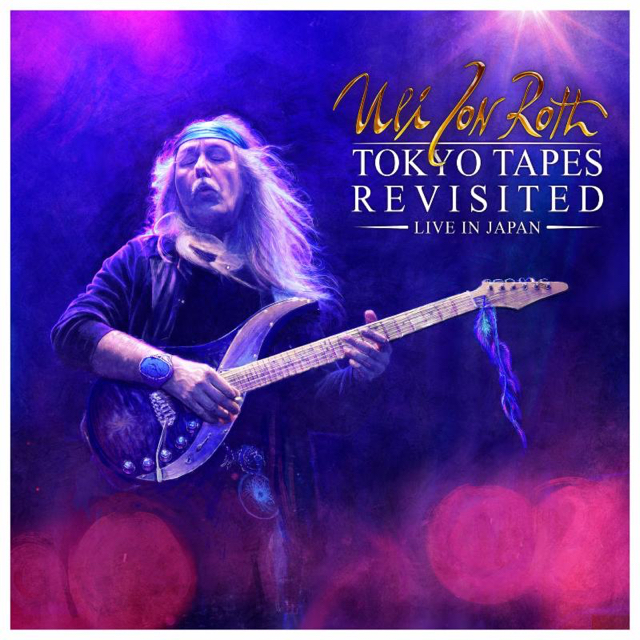
Roth: “Well you need to have some earplugs!”
BraveWords: You are a unique insertion into this whole environment and when I was watching you and please don’t take offense to this; I’m like “This sounds old," which is a good thing. This is classy, this is classic, it was so elegant just watching you. I heard a lot of Floyd, a lot of Gilmour. Is that correct?
Roth: “I don’t know. I mean, I’ve played like that for so many years and never really was a Pink Floyd guy, but I think David Gilmour’s right. I just like to play the music in a way that you can touch it; it can feel real and particularly when we play music that has been written 40-50 years ago, you have to have an authentic sound I think otherwise it doesn’t feel right. Yes, this music that we played today was written like that. If I had played one of my most recent programs; it would have sounded different. There’s a certain rough edge to it when you play these early Scorpions songs or Hendrix songs and it needs to maintain that otherwise it’s not tangible; otherwise it doesn’t penetrate to people’s hearts; it wouldn’t have a chance.”
BraveWords: One of my best friends in life was this little black pug who passed away a year ago and his name was Hendrix. So when you kicked into “All Along The Watchtower” and “Little Wing” emotions were at an all-time high. So how much did Hendrix touch you?
Roth: “Oh, fully you know? I think more than any musician in rock. To me, he was much more than a guitar player. To me he was an artist of huge genius and I wouldn’t say that about a lot of people in that genre. No disrespect, but I think he was in a different league. Nowadays, kids may not understand the way he played guitar or whatever and maybe they say, ‘oh, what’s all the fuss about?’ I was there, so I know the level of greatness that he projected and the amount of music and innovation…his level of innovation was mindboggling. None of the music in rock or metal would sound the way nowadays had Hendrix not been there. So it had a huge impact on me and I’ve learned so much from that man, many different ways, not just musically, but also spiritually, and also artistically.”
BraveWords: Did you ever meet him or see him?
Roth: “Yes and no. I was at two of his shows when I was just a kid.”
BraveWords: And where was that?
Roth: “Germany, I saw him in Hamburg when he was at the top of his game, just before Woodstock. Fantastic concert in a hall, I’ll never forget that. It changed the way I see and hear music and then I was at his very last show, the Isle Of Wight one, just days before he died. And I was backstage right next to him.
BraveWords: You’re giving me shivers…
Roth: “He was in his own world. I didn’t dare say ‘hey, Jimi’ or something; I just thought to let him be, but I took lots of photos and I was right next to him several times like when he walked right up to the stage and also when he got back into the car after the show. He was there for quite a while backstage and there was a fight that broke out with the Hell’s Angels. It was quite a weird scene and Billy Cox had a nervous breakdown and afterwards that whole thing broke up. And I was right in front of him during the whole show, taking lots of photos with my professional camera; slightly rainy so they were not the greatest photos, but that’s the memory I have.”
BraveWords: And when he died, what happened to you?
Roth: “It was a really tragic day because I felt very close to Jimi Hendrix and he was kind of like the first person that I was close to that died and that was strange. I remember on the day that it happened, I was at a school party and they used my amplifier as a PA system and they asked me to play and I played Jimi’s songs for about half an hour. My little vox AC30, played like ‘Voodoo Child (Slight Return)’ and ‘The Wind Cries Mary’, and all the hits and stuff. So that’s what I remember about the day that Jimi died.”
BraveWords: How well could you replicate those songs?
Roth: “Probably not well at all. I thought it was good, but nowadays I’d probably roll my eyes and say ‘this is terrible’.”
BraveWords: I only say that because you are such a teacher as well.
Roth: “I was just a kid who started to play guitar. I played the guitar for one maybe two years at that time. I knew that guitar playing came very easy to me, it was not a struggle. It was more like a homecoming, so I felt comfortable playing Jimi’s songs, but nowadays I have a much better perspective and initially I really didn’t know anything about music theory or full stop. It was just all ears and emotion so I’m sure that I did many things wrong when I played these songs, but I grew up with that stuff and my ears still delve into it.”
BraveWords: Two-pronged question then – hopefully you don’t mind; I mean we could on with this Hendrix stuff…
Roth: “No! Go for whatever. We played it today you know and to me it’s always an honor to play these songs because I also do it deliberately to show the bridge of where it’s all coming from and even all the Scorpions and the time that I was there; it was a strong Hendrix influence coming from there. You can’t really hear it on a song like ‘We’ll Burn The Sky’ or ‘In Trance’, but it was there underlying all along because I made it so and I also think it was a strange combination, maybe not totally homogeneous, but it gave something very very distinctive to the early Scorpions, and maybe no other band had to that degree. It’s a very strange combination and it worked!”
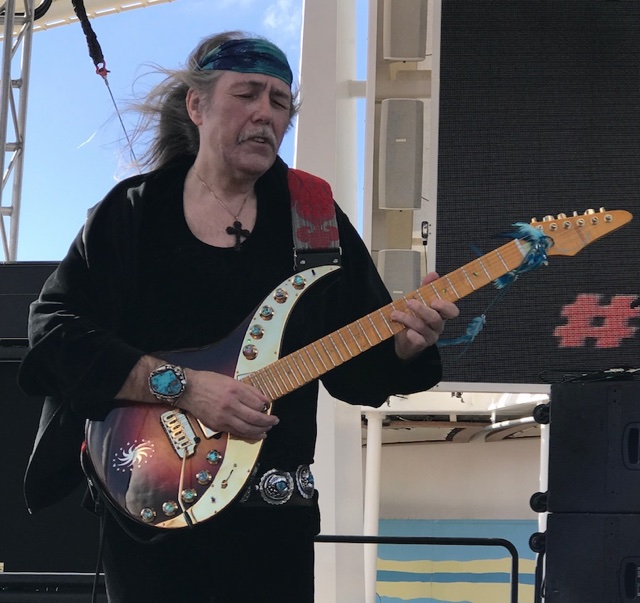
BraveWords: So what do you think his major crowning achievement was and what do you think is the hardest to play from him?
Roth: “His crowning achievement was every single album he did. They were all brilliant from the first to the very last peaking with Axis: Bold As Love. Certain songs, particularly the title track and ‘Little Wing’ peaking big time with Electric Ladyland and peaking again with ‘Star-Spangled Banner’ and peaking again with ‘Machine Gun’, Band Of Gypsies. How cool was that you know? Like a totally different thing. It was just incredible what that man did in four years completely reinventing music. I cannot even think of any classical artist, even the greatest like Beethoven or Bach or Mozart, who were as original, because all the classical artists were the greatest ones, they were all coming from the school and they always used what was there before and they made it a little better and maybe more inspired. Hendrix kind of did the same. Like with his blues and soul background, he took it to a level which was totally out of this world. Like at Woodstock doing the ‘Star-Spangled Banner’, as a black person at the height of the Vietnam War shredding the national anthem that he grew up with, sworn allegiance to and turning these few notes into an incredible scenario of war. And basically he was holding a huge mirror in front of the entire nation and a lot of people got it. Just like a lot of people got (Bob) Dylan earlier, so Hendrix was like the continuation of Dylan at that point, but it doesn’t get better than that.”
BraveWords: I find it fascinating that Hendrix had an impact on the whole Scorpions era in the ‘70s.
Roth: “Well, he did because I was in love with his work and his message. Later on, more and more I brought the classical in because I had two distinct roots in my musical life. The classical was 50 percent and classical took over, but I never forgot my Hendrix vibe and I don’t ever want to forget it because it gave me something I haven’t found in any other type of music. It’s as simple as that.”
BraveWords: Well, the Scorpions certainly took a different path after you left.
Roth: “Sure, sure. They carried on the path that was kind of there, but it became a little bit more monochrome. With me there was more color, but they made it more commercial and in many ways more to the point. The songwriting got better, Rudolf (Schenker) and Klaus (Meine) got better and better and better and it was a great achievement to be able to do that. So it was great what they did.”
BraveWords: What is one of your fondest memories of the Scorpions that you didn’t play on?
Roth: “I didn’t really follow their tracks, because once I started Electric Sun I left that entire thing behind me. I forgot all about it, but when I heard that song ‘Send Me An Angel’, I thought that was a masterpiece. I thought ‘Wow, I’d love to play guitar on that.’”
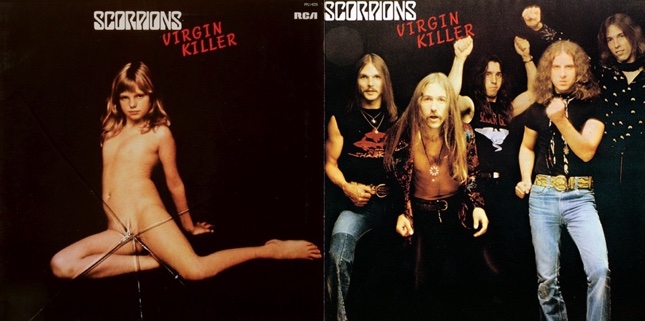
BraveWords: And I have to ask about the whole Virgin Killer artwork controversy with Wikipedia a few years back.”
Roth: “When we did the album I didn't think there was anything wrong with it. But now since I have a daughter, I find it quite embarrassing. Not that I didn't see it, because I was just a kid. I thought, why not? It wasn't my idea, it was the record company’s idea.”
BraveWords: Do you miss the classic vinyl days?
Roth: “Not sonically, but the covers yes. The CD is Mickey Mouse stuff. But sound-wise, there were some issues with albums back then, but it was more special because it was more physical. You had the A-side and the B-side and you had to pay attention. It was more of an event. So I welcome that they are selling vinyl again. I still think we need a new audio revolution, but nobody seems to be caring about it. We use MP3s now, which is the death of sound as we know it. But everybody seems to be content with it.”
BraveWords: Did you ever visit Electric Lady Studios?
Roth: “No, I was invited to several times, but I could never make it. They've invited me to record there. But Jimi really owned that at the end. But I recorded two of the Electric Sun albums at Olympic Studios, and that's where some of my favourite Hendrix stuff was recorded. I had been checking out a lot of studios in London for sound and I just ended up using that one, because I love the sound so much. Sadly it doesn't exist anymore.”
